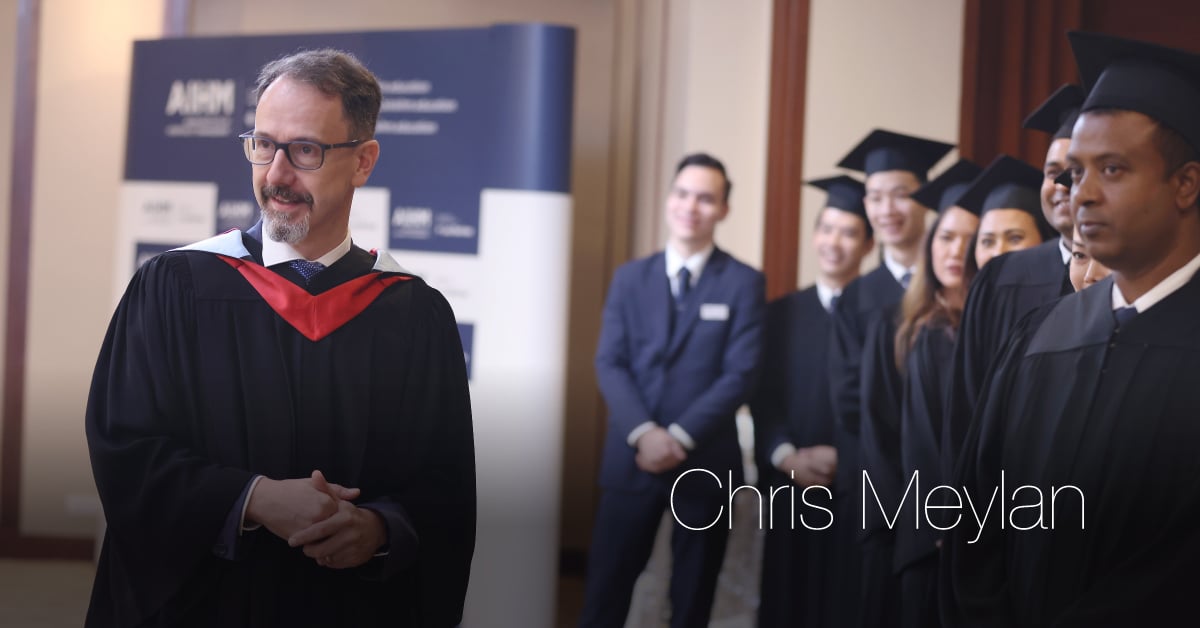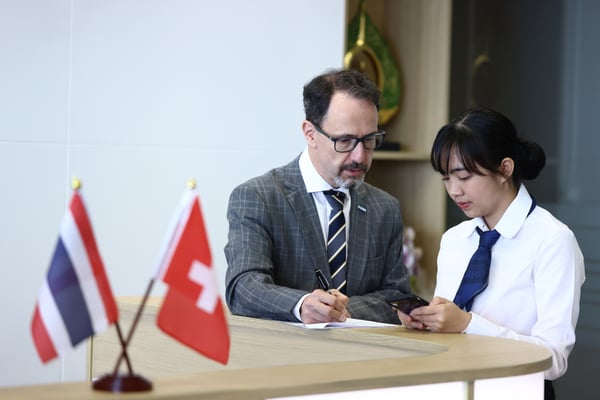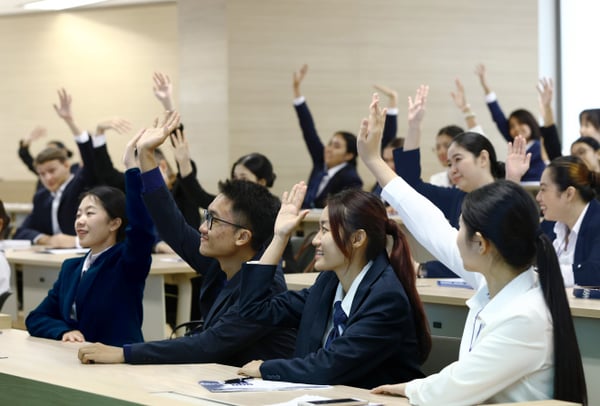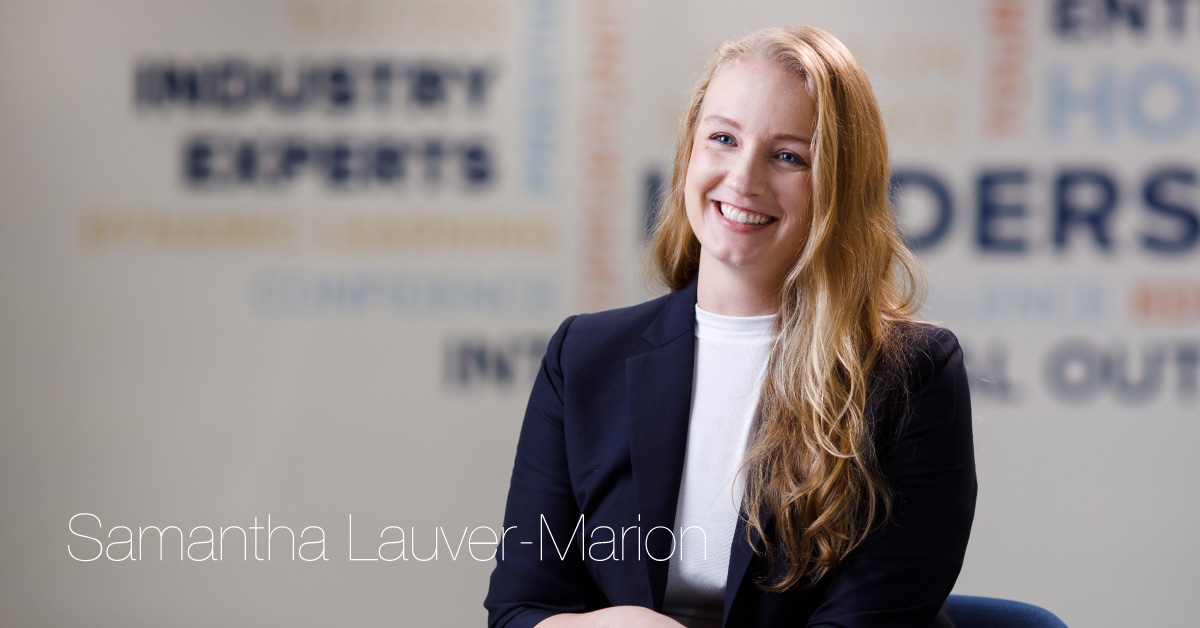Meet the Instructor: Chris Meylan

AIHM’s Meet the Instructor series invites you to get to know our hospitality management faculty inside and outside the classroom. Discover their passions. Learn about their lives before AIHM and the journeys that led them to where they are today.
Chris Meylan, Educator and Chief Operating Officer at the Asian Institute of Hospitality Management
As COO at AIHM, Chris Meylan plays a central role in making AIHM a premier institution for learning the art and science of hospitality. In addition to his leadership role in terms of administration and strategic development, he plays a vital role in the individual educational journeys of all AIHM students.
He teaches key courses in the BBA degree in Global Hospitality Management and the Certificates in International Hotel Administration and leads professional development courses in topics such as Customer Service Excellence and Digital Marketing within AIHM’s Executive Education programme.
Discover what Chris Meylan loves most about teaching, the insights he’s gained over his teaching career, and what he loves to do when he’s not hard at work guiding and mentoring the hospitality leaders of tomorrow at AIHM.

Q&A with Chris Meylan
Why do you teach?
I’m good at explaining things and giving clear explanations, at taking difficult concepts and making them easy for people to understand. When I was a student at university, I was always the person friends would seek out to get clarity about what the teacher had explained. Later, when I worked in hospitality, I always took the time to train my team members, whether teaching them the practical standards in a restaurant or explaining how to use a software programme or an unfamiliar system.
 I’ve always appreciated seeing the sparkle of recognition in someone’s eyes when they realise they ‘get it’. I feel good to have been part of that understanding. Teaching revolves around the same logic, around how to unlock understanding in people through a skillful explanation. Being able to take a difficult concept and making it understandable is an essential skill for a teacher.
I’ve always appreciated seeing the sparkle of recognition in someone’s eyes when they realise they ‘get it’. I feel good to have been part of that understanding. Teaching revolves around the same logic, around how to unlock understanding in people through a skillful explanation. Being able to take a difficult concept and making it understandable is an essential skill for a teacher.
In addition to making something understandable, you also need to make it applicable and usable. I think that’s what is really important today. People like to talk about difficult models to sound clever. But for me, theory for theory’s sake has never been enjoyable or valuable. The real value and excitement is in understanding how that knowledge can be applicable and useful to someone’s life, or how someone can improve their professional or private life thanks to the explanation they’re given. At the end of the day, every good dedicated teacher should want to improve the lives of their students.

Today, I want to go beyond just explanation. Being able to explain complex information in easy-to-grasp ways is a fundamental part of helping students learn, but successful teaching is so much more. Now, when I think about high-impact teaching, I put the utmost attention on designing instruction to provide practical knowledge and skills that people can use in their professional lives and even more broadly. That’s what is known as ‘instructional design’. Instructional design looks at how to build a course to unlock understanding through not only explanations, but also exercises, games, exercises, role-plays, reading, discussions and debates. It also includes how to use technology to allow students to apply knowledge and theories to actual cases.

I’m a big believer in flipped learning and active learning as well. I believe class time should not be about a teacher speaking nonstop to a class but about guiding students through a strategically designed learning process. I’m interested in developing and building various learning activities that culminate in deep and personally meaningful learning. For me, this is really a fun aspect of education—building courses through technology and instructional design to make learning real.
Could you talk a little bit about your own educational background?
I’m actually a hotelier by background. My father used to be a chef and my parents had their own restaurant. So, I grew up in an environment dedicated to hospitality. Funnily enough, I wasn’t a very good secondary school student. I didn't go straight into university or a purely academic track. I decided I wanted to attend a hospitality management school in order to work in hospitality and then travel. In Switzerland, we are lucky to have an apprenticeship system, where you actually work and study at the same time. I worked as an apprentice at the reception of a small hotel in Montreux and went to EHL. I really enjoyed my studies there and realised that I truly loved learning about the hospitality business. The concepts were easy for me to grasp, and I loved working on projects in teams. I saw myself working in hotels and becoming a GM.
 Photo credit: https://www.ehl.edu/en/campuses/campus-lausanne
Photo credit: https://www.ehl.edu/en/campuses/campus-lausanne
From there, I went to Thailand to complete my management internship, and I discovered a new world. I feel instantly in love with the country and its people. I knew I wanted to come back, so I did after I finished my studies. I worked around four years in five-star hotels after graduating. Managing hotels was a great experience. What I enjoyed the most about being in management was training and teaching people, helping them become better at their jobs. My philosophy has always been that you need to teach your team members in order for them to become better and improve at their job. I’m a believer in continuous learning. I always found it fulfilling to help people to learn, to become better at their job and to grow.
I enjoyed being a manager, but work-life balance in the roles I was seeking out was a problem. So long story short, my wife and I decided to go to Switzerland. But we didn’t want to continue the same kinds of professional roles in hotels. I was looking for different types of jobs where I could apply my skills in new ways, and I began working for a hospitality consulting company. In addition to consultancy services, the company also provided executive education programmes. One day, the expert not being available, my boss told me that the next day I would be teaching! I was terrified, and a bit sick to be honest, but I managed it and realised that I actually enjoyed teaching. I loved sharing knowledge, explaining things, facilitating groups and activities. I decided to seek out a teaching job.
 Photo credit: https://www.shms.com/en/visit-swiss-hotel-management-school/
Photo credit: https://www.shms.com/en/visit-swiss-hotel-management-school/
This was the next step in my career. I was accepted as programme leader at the Swiss Hotel Management School in Leysin, Switzerland. I spent 12 years on that campus, and I had an incredible experience and great mentors that helped me develop as an educator. I taught almost everything that can be taught in a hotel management school, at all levels from undergraduate to postgraduate. I taught subjects from F&B Management to Accounting, Banqueting, Rooms Division, Project Management, Entrepreneurship, Events Management and many more. I eventually settled on Marketing and Digital Marketing, as well as Strategy and Strategic Thinking.

At the Swiss Hotel Management School, I learned a lot about being an educator. I started as a very traditional teacher, being very teacher-centred, delivering theory, boring my students to tears and focusing on knowledge. Over time, I learned about being student-centred, facilitating rather than delivering theory. I discovered the value of focusing on student learning, rather than the teacher delivering theory. I devoted my teaching practice to active learning principles and learning activities. I focused on trying to make my classes as engaging and enjoyable as possible but still with the aim of learning—or more accurately, so that learning came more easily and effectively.
 Photo credit: https://www.linkedin.com/pulse/journey-becoming-apple-distinguished-school-our-ed-tech-earnhart/?trackingId=gDdt4OG%2BMMo%2Bwz51BMNMCA%3D%3D
Photo credit: https://www.linkedin.com/pulse/journey-becoming-apple-distinguished-school-our-ed-tech-earnhart/?trackingId=gDdt4OG%2BMMo%2Bwz51BMNMCA%3D%3D
One of the biggest changes that occurred in my teaching career was when the management decided to introduce iPads in the school. My academic director told me he didn't want to use technology to just replace PowerPoint slides but to really re-think the way learning happened with our students. So, I did some research and looked into how innovative schools used technology to make learning more engaging and meaningful. I was really inspired by how flipped learning could be a powerful approach to motivate students and also how I could use simple games, gamification and game-based learning to make my classes fun. I’m really passionate about gamification as a tool for learning and have even delivered a TedX talk on the subject. I implemented these changes and trained my colleagues.

I also applied to Apple to be recognised as an Apple Distinguished Educator (ADE), which is distinction awarded to educators who pioneer innovations in their areas of teaching practice by using technology. I was accepted into the programme, and it changed my view on education even further. We could of course be cynical about a programme that is organised by a tech corporation, but the people running this programme really had the benefits of education in mind and valued the ways technology can help us rethink the way learning happens. As an ADE, you join an event where you meet like-minded academic peers and discover examples of the amazing ways other teachers are enhancing and transforming their students’ learning thanks to technology. This helped me re-think and innovate my teaching practice even more.

I also took the time to study further and become a better educator from a theoretical perspective, earning a second postgraduate degree—this time, a Master’s degree in Education. (I already held a Master’s degree in International Hotel Management.)
My own learning journey and the transformative experiences I’ve had in evolving my own teaching practice and making radical differences in learning outcomes continue to motivate me to implement these kinds approaches within the faculty at AIHM. My experience has let me to focus on making AIHM a place where educational innovation thrives and where student-centred learning is put at the forefront of everything we do.

What are your biggest hobbies or interests outside the classroom?
I love games and, more specifically, board games. Back in Switzerland, I had a group of friends I would get together with regularly to play board games for an entire day. Some of the games I love are strategic. Some are story-based. Some are card deck building games. These are games that are a bit esoteric and not necessarily well-known by the general public. Maybe the most famous one is Catan, for instance. My wife and I also play as a family with our daughters. We’ve been playing these games with them ever since they were small. We make it a family ritual to spend a couple of hours playing a game together. It’s a great way to share time together, connect and have fun.
.png?width=600&height=450&name=MicrosoftTeams-image%20(58).png)
I also love the learning elements of games as well. I was always fascinated and happy to see that the girls were developing strategic thinking skills through the games we’d play. I even developed a game to play in my classes to teach strategy.
In addition to games, I like a good story—whether as a novel, a movie or a TV show. I particularly enjoy historical stories and find that knowing what happened in the past helps you to understand the present and the future.
If you could pass on any wisdom to your students, what would you share?
The quote, "It's only when you start knowing that you actually realise you don't know anything", which is often attributed to the ancient Greek philosopher Socrates, really resonates with me. I love learning. I’m excited by learning new techniques, new ways of working, using technology to advance, being curious, finding ways of doing our jobs better, always trying to improve. We can only progress in this way by learning, including learning from our mistakes. Mistakes can be the best teacher—as long as we are willing to move forward.

But the beautiful thing about learning is that the more you learn about anything, the more you realise that you don’t know much and that you need to keep learning even more.
My recommendation to anyone is to keep that thirst for learning. Stay curious. Be willing to admit that you don’t know, and that you are always open to learn more. That is the best way to grow. Lifelong learning is something that is bandied around a lot in academic circles, but its importance and power are so true. With this changing world that is always transforming so fast, how do you keep yourself on top of the changes? Simply by learning. But learning doesn’t always have to mean taking a course. It can also be reading a good book, listening to a TED talk or watching an educational video on YouTube. Learning is really about a mindset, about always having this question in the back of your mind: what will I learn about today?

The need to continually learn and grow today is why we have launched our Executive Education programme at AIHM as well. We strongly believe in the power of lifelong learning and how it can help individuals grow in their professional lives, as well as in their personal lives. We have the ambition to steer AIHM as a school that will help young people to launch their careers. With the addition of Executive Education, AIHM is also helping working professionals who have already begun their careers. We teach people who are already actively working in hospitality and are seeking to upskill and evolve their skillsets as well as people from other industries who want to enhance their mastery of areas such as customer service.
-1.jpg?width=600&height=450&name=AIHM_ExecutiveEducation_CustomerServiceExcellence%20(6)-1.jpg)
Many of the disciplines vital to hospitality management also apply to other industries, especially service industries and other parts of the experience economy. With our Executive Education courses and customised professional trainings, we’re helping people to explore their curiosity and embrace their desire to learn new things, which is the best way to be successful and continue to be successful in their career.
What’s your favourite Swiss food? Your favourite Thai food?
 In terms of Swiss food, I love any dish with cheese, like a rich, melting raclette or even a cheese board with cold cuts. Served with a good (Swiss) red wine, or even white wine, it makes a perfect meal. It’s very simple but a perfect choice for enjoying a good conversation while savouring some delicious food. In Thailand, you can find cheese, but it is quite a luxury compared to back home. When I fly back to Switzerland, I always make sure to bring some cheeses back to Thailand.
In terms of Swiss food, I love any dish with cheese, like a rich, melting raclette or even a cheese board with cold cuts. Served with a good (Swiss) red wine, or even white wine, it makes a perfect meal. It’s very simple but a perfect choice for enjoying a good conversation while savouring some delicious food. In Thailand, you can find cheese, but it is quite a luxury compared to back home. When I fly back to Switzerland, I always make sure to bring some cheeses back to Thailand.
 When it comes to Thai food, I have many favourites, but my absolute favourite is Larb Gai, or Larb Moo. I also enjoy Isaan specialities such as Grilled Pork Namtok, Isaan Sausage, Gai Yang and Som Tam. I just have to request that dishes are not too spicy. I can eat spicy, and I enjoy it, but I am definitely not at the advanced spice level of Thai people. Overall, I love the intensity of flavour that defines so much of Thai cuisine.
When it comes to Thai food, I have many favourites, but my absolute favourite is Larb Gai, or Larb Moo. I also enjoy Isaan specialities such as Grilled Pork Namtok, Isaan Sausage, Gai Yang and Som Tam. I just have to request that dishes are not too spicy. I can eat spicy, and I enjoy it, but I am definitely not at the advanced spice level of Thai people. Overall, I love the intensity of flavour that defines so much of Thai cuisine.
Keep Your Finger on the Pulse of Global Hospitality Education
What are the skills needed by the newest generation of hoteliers? What innovations are driving the evolution of hospitality training and education? Find out by following AIHM on Facebook, LinkedIn and Instagram.
We always love to make connections with other passionate hoteliers and aspiring hoteliers. Stay on top of industry trends and opportunities by following us on social media and exploring the AIHM Higher Blog.


